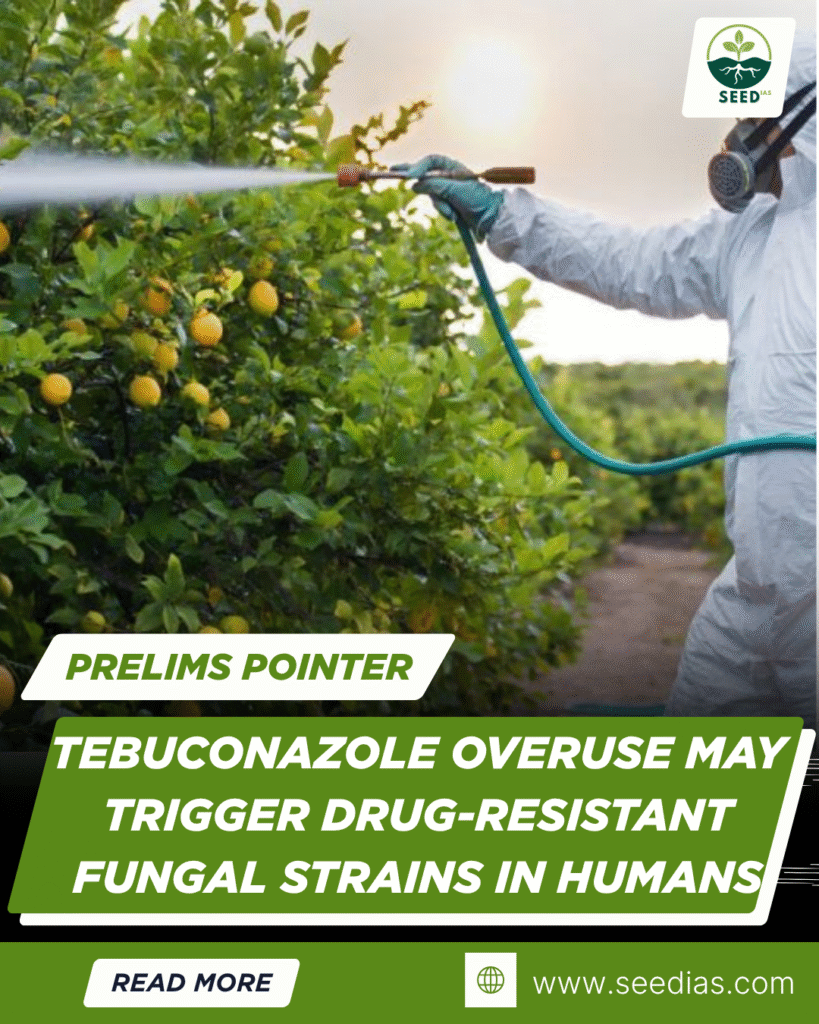Why in NEWS
A recent study has shown that the widespread agricultural use of the fungicide tebuconazole is promoting drug resistance in the human fungal pathogen Candida tropicalis, raising serious public health concerns.
Key Concepts and Definitions
| Term | Explanation |
|---|---|
| Tebuconazole | A systemic agricultural fungicide used to treat fungal infections in crops; chemically similar to medical antifungals. |
| Candida tropicalis | A human fungal pathogen causing invasive infections with high mortality (55–60%). |
| Fluconazole/Voriconazole | Antifungal drugs used in medicine to treat fungal infections. |
| Aneuploidy | A condition of having an abnormal number of chromosomes, affecting gene expression. |
| Ploidy | Refers to the number of complete chromosome sets in a cell (haploid: 1n, diploid: 2n, triploid: 3n). |
News Details
Researchers found that tebuconazole exposure can induce genetic mutations in Candida tropicalis, particularly aneuploidy, which helps the fungus survive fluconazole and voriconazole treatments. Some strains became haploid, giving them mating potential and enabling faster spread of resistance. While these strains grow slower in the absence of drugs, they gain survival advantage under antifungal pressure.
Objectives and Key Features
| Feature | Details |
|---|---|
| Action Mechanism | Tebuconazole inhibits ergosterol synthesis, essential for fungal membranes—similar to human-use antifungals. |
| Cross-Resistance | Genetic similarities between agricultural and clinical antifungals lead to unintended resistance in human pathogens. |
| Chromosomal Impact | Induces aneuploidy, which alters expression of resistance genes. |
| Spread of Resistance | Haploid strains may mate and spread resistance traits more widely. |
Significance
| Aspect | Impact |
|---|---|
| Health Concern | Infections by resistant Candida tropicalis are harder to treat and highly fatal. |
| Drug Efficacy | Overuse of farm fungicides threatens the future effectiveness of clinical antifungals. |
| Agricultural Practices | Highlights the need for regulation in fungicide application to prevent resistance crossover. |
In a Nutshell
Memory Code: “FARM-FANG: Farm Antifungals Risk Medical Gains”
Overuse of agricultural fungicides like tebuconazole may silently undermine modern medicine’s tools against deadly fungal infections.
Prelims Practice Questions
- Tebuconazole primarily affects fungi by interfering with:
a) Cell wall synthesis
b) DNA replication
c) Ergosterol biosynthesis
d) Protein synthesis - What is aneuploidy?
a) Increase in cell size
b) Cell division without chromosome separation
c) Change in chromosome number
d) Loss of genetic material due to mutation - Candida tropicalis is classified as:
a) Bacterium causing food poisoning
b) Human viral pathogen
c) Drug-resistant fungal pathogen
d) Soil-dwelling algae
Mains Practice Questions
- (GS Paper 3 – Health and Environment)
Discuss how agricultural practices contribute to the rise of antimicrobial resistance. Examine the case of tebuconazole and Candida tropicalis. - (GS Paper 2 – Governance)
What policy measures can India adopt to balance agricultural productivity with public health safety in the context of fungicide overuse?
Answer Key for Prelims Questions
| Q.No | Correct Answer | Explanation |
|---|---|---|
| 1 | c | Tebuconazole inhibits ergosterol synthesis, vital for fungal cell membranes. |
| 2 | c | Aneuploidy refers to an abnormal number of chromosomes in a cell. |
| 3 | c | Candida tropicalis is a fungal pathogen with growing resistance to medical antifungals. |














